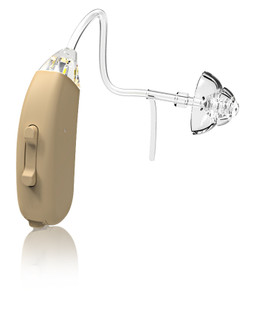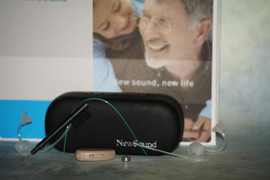The Link Between Hearing Loss and Mental Health: What You Should Know
Posted by DR Paul on Mar 13, 2025
In our journey through life, hearing is one of the most crucial senses that connects us to the world. It allows us to enjoy conversations with loved ones, listen to our favorite music, and experience the sounds of nature. However, as we age, or due to certain conditions, this vital sense can begin to fade. While hearing loss is often seen as merely a physical ailment, its impact on mental health cannot be understated. This blog seeks to explore the intricate link between hearing loss and mental well-being and how taking proactive steps—such as considering hearing aids—can enhance both auditory and emotional quality of life.
Hearing loss affects millions worldwide:
Hearing loss affects millions worldwide and goes beyond just an inability to hear clearly. The social implications are profound; individuals with untreated hearing loss often find themselves withdrawing from social interactions. This withdrawal can stem from feelings of embarrassment or frustration when trying to communicate in noisy environments or even in small group settings. Over time, this isolation can lead to depression—a common consequence among those who struggle with untreated hearing impairments.
Communication is not just about exchanging words:
Further deepening this connection is the role that communication plays in our lives. Communication is not just about exchanging words; it’s about forming connections and sustaining relationships. When someone starts experiencing difficulty in understanding conversations or mishearing information frequently, it becomes a source of stress and anxiety—not only for them but also for their family members. Anxiety arises from constant worries about misunderstandings or missing out on important details during conversations.
Cognitive decline has been linked with untreated hearing loss:
Moreover, cognitive decline has been linked with untreated hearing loss. Studies have shown that individuals with hearing impairments are at a higher risk of developing dementia compared to those without such challenges. While the exact reasons remain under research, it’s believed that reduced auditory input may contribute to cognitive overload where the brain works harder than usual just to process sound information—often at the expense of other cognitive functions.
Hearing Loss Solutions:
Thankfully, there are tangible solutions available today which are designed not only to improve one's ability to hear but also enhance overall mental wellness by boosting confidence and encouraging active participation in life's moments. Modern hearing aids come equipped with advanced technologies designed specifically for clarity in various listening environments—from crowded restaurants to quiet libraries—and ensure seamless communication across different platforms like phone calls or video chats.
Choosing the right kind of support like investing in a reliable pair of digital hearing aids can make all the difference when it comes down not just improving your auditory health but also enriching your life experiences altogether by keeping you connected socially while safeguarding your mental health too.
Understanding the link between hearing loss and mental health underscores why addressing auditory issues should be prioritized not only for better physical well-being but also for maintaining strong emotional resilience against potential psychological challenges such as depression or anxiety disorders stemming from prolonged periods without adequate intervention measures like using appropriate supportive devices such as customized high-quality digitalized earpieces specifically tailored towards meeting individual needs comprehensively yet comfortably over time ensuring maximum benefit reaped continuously moving forward into future endeavors ultimately leading towards healthier happier fuller richer living every day thereafter always!










